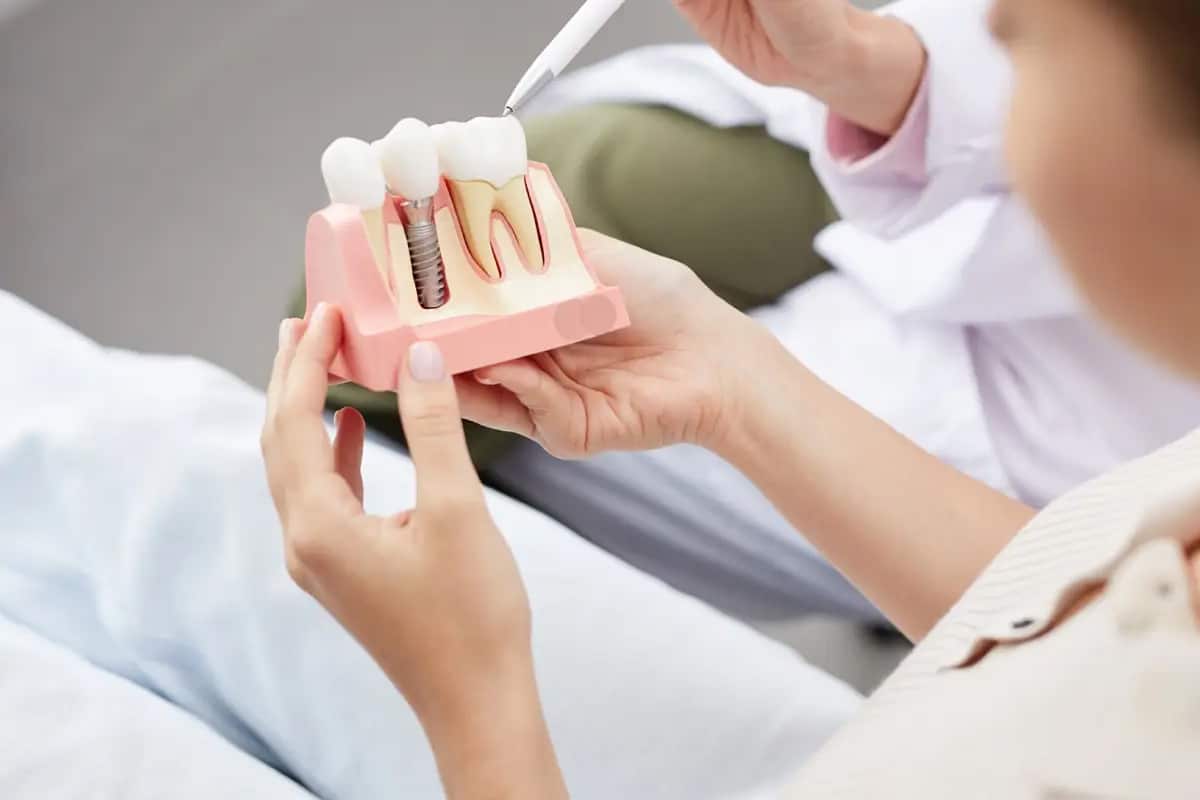940-298-8467
Free Dental Implant Consultation

Schedule your Free Dental Implant Consultation ($100 value).
Why are we offering a FREE consultation and evaluation? Because we are confident we have the solution for you, whether the solution is to replace multiple missing teeth or just a single tooth. Dr. Vo and Dr. Tran at Denton Smiles Dentistry are the top Dentists in Denton, TX. Denton Smiles Dentistry has been voted the Top Dentist in Denton for three years straight by the readers of The Denton Record Chronicle.
Are you ready to book your FREE Implant consultation? Call us at (940) 298-8467! Want more information about Dental Implants? Keep on reading below, and then call us with any questions.
Consequences of not addressing your missing teeth.
Your teeth are like a team, when one is missing, the entire group has to figure out how to work without the missing tooth. When you are missing 1 tooth, the teeth on that row will begin to migrate towards the gap in order to “fill in” that spot. Whereas your adjacent tooth (top or bottom depending on which is gone), will begin to grow downward in order to restore your bite. This will also happen when you are missing multiple teeth!
The most concerning part is your bone volume. When your tooth is gone, the bone will ‘’realize’’ that your tooth is no longer there, and continue to shrink unless an implant is placed. By replacing the missing tooth, this will preserve the integrity of all the surrounding teeth.
What are dental implants and how is it performed?
Dental implants are an alternative way to replace teeth that have been infected, or are missing. They simply consist of 3 things, a root, a replacement tooth, and an abutment.
The Root: this is made of titanium; it basically imitates what your real tooth’s root does.
The Replacement Tooth: This is a dental crown that has been constructed to resemble the tooth you are going to be replacing.
The Abutment: This is what connects the root to the replacement tooth, that way if your tooth is in need of reparations, changes, or etc, you do not have to do a complete do-over. It will simple be disconnected and replaced.
Dr. Glenn Vo or Dr. Ted Ling will do the normal measurements and planning for your surgery. Afterwards he will then perform your dental implant by surgically replacing your real tooth root with the replacement root. You will go through a trial of healing where the titanium has coalesce with your bone. Once you have healed, he will then attach the replacement tooth to the replacement root using the abutment. A very simple surgery!
What are the advantages of having dental implants?
There are 3 different choices one can make when deciding how to replace their teeth. (1.) Dental Implants (2.) Dental Bridges (3.) Dentures. Each of which vary from each other. Previously, we have explained what dental implants are, but what advantages does it have over the other 2 choices?
Dental Bridges: Dental bridges hold a replacement tooth by also using dental a crown. It builds a “bridge” between the gaps of the teeth. A dental bridge does not require surgery, because there is no replacement/titanium root that will be inserted into the bone. However, the lifespan of a dental bridge is not as long as a dental implant. Dental bridges tend to survive about 10 years and their durability is not like the dental implant, which can last an entire lifetime. Dental bridges are also more susceptible to infection and decay, because unlike the dental implant, it is not connected to a replacement root and a part of your real tooth still resides. Dental bridges are different to dental bridge implants, one does not require surgery and the other one does. The implant allows for you to eat more difficult foods (E.G. hard candies, sticky foods, chewy foods like steak, etc)
Dentures: Dentures are typically only for when you need to replace an entire row of teeth. They are an inexpensive method to have your smile back. Generally, dentures are used through denture adhesive and are placed onto your gums. However, there are disadvantages in using dentures. If not properly placed with adhesives, they can uncomfortably move and possibly fall out. You can also have the option to have implants that hold the dentures and still have the dentures removable, or have implants, which are not removable.
Which implants are for me?
Missing one tooth
The best implant for one missing tooth is the single dental implant. This process will vary over a span of 6 to 9 months. The first surgery is initiated in the beginning where the implant will be placed in your bone. This implant resembles a screw and is made of titanium. It will imitate your old tooth’s root and prevent your bone from shrinking. They will stitch this close in order to allow it to fuse. Once you have properly healed, they will re-expose your implant. A temporary healing cap, or a collar, will be placed onto the implant; this guides the gums to heal correctly and align. Once you have healed, you will return for the attachment of the permanent replacement tooth using an abutment.
This photo shows the implant titanium screw (the bottom screw-like bolt), the abutment (silver connection piece in the middle), and the replacement tooth.
Missing multiple teeth
The best implant for multiple missing tooth is the bridge-supported implant. This process will vary over a span of 6 to 9 months. The first surgery is initiated in the beginning where the implant will be placed in your bone. This implant resembles a screw and is made of titanium. It will imitate your old tooth’s root and prevent your bone from shrinking. They will stitch this close in order to allow it to fuse. Once you have properly healed, they will re-expose your implant. A temporary healing cap, or a collar, will be placed onto the implant; this guides the gums to heal correctly and align. Once you have healed, you will return for the attachment of the permanent replacement tooth using an abutment. The permanent replacement dental crowns will be multiple teeth (depending on how many are being replaced) creating a ‘bridge’ and will be connected, using an abutment, to the implants placed in your bone.
See more info on which implant is right for you here.
This photo shows the (3) implants, the abutment (the black screws in the middle), and the implant-bridges (the teeth below the abutments).
Dentures
If you have dentures, implant-supported dentures are the best option for you. Unfortunately, many struggle with normal dentures due to the slippage, or sometimes they fall out, when you are eating foods with texture. You cannot enjoy the normal things you want to.
The process for denture implants is as simple as the previous 2 types of implants.
There will be a two step process for your implants. There will be multiple implants placed into your jaw. These implants have ball like points at the top in order to connect to the dentures. Once these ball-retained implants are placed, stitched over to allow healing. Once the sufficient amount of time has passed, it will be re-exposed to place healing caps over the implants. Your dentist will then adjust accordingly for your dentures to be able to fit. Your dentures will then be fitted to get the correct frame-work for your teeth. Once this is finished, the ‘balls’ on the implants will then be connected to the ‘socket’ on the bottom of the denture. This will vary, as the denture could have the ball retained portion, and the implants with the socket.
Here we can see the implants (the screws on the top ) with balls, the socket portion (positioned on the dentures), and dentures ready to connect.
Hopefully, this blog has served to give you a better understanding of what and how dental implants are. We want to provide the best explanation in order for you to make the best next decision on bettering your dental health.
If you have any questions or want to book the Free Consultation, please give us a call at – (940) 298-8467



